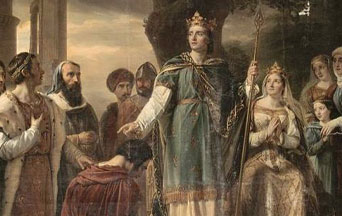
As the transition to a new American government approaches, both parties will use, and some say, abuse, the presidential pardon. The President has the right to grant clemency to those guilty of federal crimes.
The original purpose of the pardon is to mitigate the harsh demands of justice. It is a uniquely Christian institution that reflects a balance in the practice of virtue not found in pagan cultures.
The American Use of the Pardon
Medieval historian Ken Mondschein comments that America’s use of the executive pardon comes from the justice associated with medieval kings. This royal prerogative was transferred seamlessly to the President in the American Constitution.
Why America Must Reject Isolationism and Its Dangers
Indeed, the Constitution states, “The President… shall have Power to grant Reprieves and Pardons for Offences against the United States, except in Cases of Impeachment.” Dr. Mondschein notes that the granting of this power was “remarkably uncontroversial amongst the Framers.”
Alexander Hamilton, for example, saw the pardon as a moderating influence in society. He thought its use was best exercised by one person, which would have the effect of “countermanding both the passions of the moment and the overzealousness of the law.”
Medieval References
This appeal to balance and calm enshrined the pardon into Western law. Its Christian use is found in ancient chronicles.
Dr. Mondschein notes, for example, that one of the earliest references to executive clemency can be traced to a statute of King Ine of Wessex (688–725). Other references can be found in Blackstone’s 1765 Commentary, a classic legal text that greatly influenced American jurisprudence.
The kings of France also widely exercised this prerogative, particularly on special occasions. Joinville, the contemporary biographer of Saint Louis IX, tells of a case where a clergyman killed three royal soldiers who had robbed him. The cleric surrendered to Saint Louis, who pardoned him and ordered that he accompany him on his coming crusade.
Making Justice and Mercy Personal
The use of the pardon underscores the sacred and symbolic role of the king, who was perceived as someone above the petty corruption of the state, to whom people might have recourse. He protected the common people from legal abuses of officials. Dr. Mondschien notes, “while justice systems are impersonal, institutional, and coldly rational, the pardon is personal, individual, and emotional.”
Eternal and Natural Law: The Foundation of Morals and Law
The pardon completes justice by considering extenuating circumstances or tempering the sharp edges of laws. It does not deny that the law has been transgressed but proposes other solutions. As in all things human, it could be abused, but the goal was not to undermine justice but to make it more human and flexible.
Pardons as a Point of Unity
Another aspect of the pardon is its social implications. The use of the pardon served to bring about the reconciliation of factions in times of civil strife and fractions. It could help build necessary alliances that would promote the common good. The pardon could serve as an instrument to unify society and iron out differences in an organic way.
The pardons could range in granting mercy in cases of capital punishment, commuting sentences or the levying of fines. It can be either full or conditional. When full, it blots out the guilt and clears the name of the offender. When conditional, the offender accepts conditions or even a lesser punishment. The pardon should increase trust in the justice system.
A Triumph of Natural Law
Dr. Mondschein notes that the survival of the medieval pardon into modern times is often seen as a “triumph of natural law” since positivistic law has no mechanism inside its cold, rigid categories to manifest mercy. He claims that “pardons come in when the mechanisms of the state…have failed, and only a higher power can bring justice.”
Today’s massive use of the presidential pardon reflects a breakdown of trust in governing institutions. However, it also reflects the chaotic decay of law, in which some officials see the criminal as a victim rather than a malefactor. Some modern attorneys general would issue universal pardons to reflect this distorted vision that undermines the law.
 Learn All About the Prophecies of Our Lady of Good Success About Our Times
Learn All About the Prophecies of Our Lady of Good Success About Our Times
The Christian pardon in no way denies the violation of the law or the justice of a punishment. It releases the person from guilt or proposes a remission of punishment. However, the pardon also sees that the passion of circumstances can influence the enforcement of the law. To mitigate those situations, the executive can propose mercy to temper, not supplant, justice.
The Christian use of pardon comes from the idea that there are times when mercy needs to temper justice. Indeed, this pardon reflects what all Christians, as sinners, will need when they face their judgment by God.

